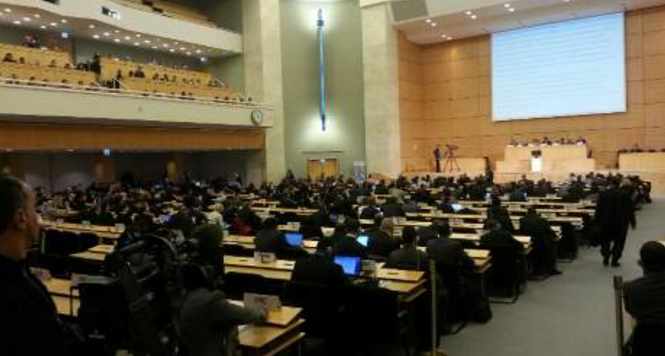
On 17-18 November, hundreds of delegates from around the world convened in Geneva to begin formal negotiations on the wording of the successor instrument for the Hyogo Framework for Action (HFA), the flagship (if non-binding) international agreement on how to reduce the impacts of disasters and build resilience. To help shape these negotiations, the IFRC, the United Nations Development Programme (UNDP), and the World Bank came together to put forward shared views on how this new international framework should be addressing legislation for disaster risk reduction.
The November preparatory meeting was one of a series of meetings to be held before states sign up to the new framework in March next year at the Third World Conference on Disaster Risk Reduction in Sendai, Japan. While the HFA identified the development and strengthening of legislative frameworks as a key step for states to make disaster risk reduction a national priority, the zero draft of the Post-2015 Framework for DRR did not yet provide adequate emphasis or guidance on legislation as a tool for strengthening disaster risk management. Concerned by this shortcoming and in light of their collective interest in this area, the IFRC, UNDP, and World Bank developed a joint submission on the legislative components of the next framework.
The joint paper asks for the Post 2015 Framework for DRR, among other things, to acknowledge the duty held by states to reduce risk in their own territories, to address how sectoral laws can be promoting protection from disaster threats, and to promote accountability through better enforcement mechanisms and incentives .
“It is time to acknowledge that it is not just a good idea for states to take reasonable steps to reduce the risks of disasters in their territories – it is part of their legal responsibility to their citizens. We as individuals and communities should also see it as our responsibility to do what we can to reduce our own risks” explained David Fisher, of IFRC.
Angelika Planitz of UNDP noted “While many states have taken action to develop new laws on disaster risk management since the adoption of the HFA in 2005 that is really only a first step. More needs to be done to ensure those laws are sufficiently resourced to allow for their dissemination and effective implementation. Also different sectoral laws, such as those regulating the construction sector and environmental management, need to be assessed and strengthened where necessary to achieve improved overall risk governance”.
Prashant Singh from the World Bank explained, “by working together and demonstrating our collective interest and experience in this area, we hope the next draft of the framework will provide clearer guidance to states on how legislation can be used as a tool to better protect both people and livelihoods from the effects of disasters”.
The joint paper, setting out these shared views and suggestions, can be downloaded here. Negotiations on the text of the Post-2015 Framework for DRR will continue in both December and January, with an aim to finalise the text of the 2nd draft by 21st January 2015.